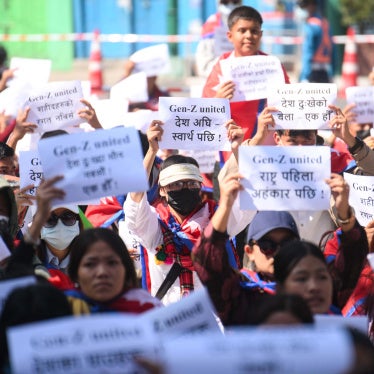(New York) - The Colombian government's television broadcast of a paramilitary demobilization risks becoming a showcase for impunity, Human Rights Watch said today. In a live telecast featuring government officials and paramilitary fighters, the government will broadcast videotaped statements from paramilitary leaders who have been convicted of massacres, murders and other serious crimes, but remain at large.
The telecast is scheduled to take place during the demobilization of an estimated 800 paramilitary fighters of the Bloque Cacique Nutibara, part of the alliance known as the United Self-Defense Forces of Colombia (AUC). Since 2002, paramilitaries have been in talks with the government about turning in their weapons. Paramilitary leaders have refused to surrender, however, and have demanded international immunity for their crimes
"The broadcast is a travesty," said José Miguel Vivanco, Executive Director of the Americas Division of Human Rights Watch. "Instead of handing these criminals a microphone, the government should be concentrating on arresting them and bringing them to justice."
Human Rights Watch questioned the strategy of allowing low-level paramilitaries to demobilize while leaving their leaders free to recruit new members and continue to operate and commit further crimes. As yet, no clear rules have been established to ensure that individuals who have committed serious human rights abuses will be prosecuted or even investigated.
Among the paramilitary leaders scheduled to speak via video to a live television audience is Carlos Castaño, the head of the AUC. A survey of the crimes that Castaño has been convicted of or has admitted to makes horrifying reading.
In 2001, a Colombian judge sentenced Castaño to 22 years in prison for his role in the assassination of Patriotic Union presidential candidate Bernardo Jaramillo Ossa, shot in 1990 in Bogotá's El Dorado airport. Since its founding in 1984, the Patriotic Union has been virtually exterminated in attacks on party members by paramilitaries under Castaño's command, often working in coordination with Colombia's military.
In his authorized biography, Mi Confesión, Castaño gave a detailed account of how he selected and trained the juvenile assassin who in 1990 murdered a second presidential candidate, M-19 leader Carlos Pizarro; this was the same boy who authorities say he used to kill Jaramillo. As a result, the Attorney General's office recommended in June 2002 that Castaño be convicted of the murder and sentenced to 60 years in prison.
Castaño has also acknowledged that he planned the 1994 assassination of Colombian Senator Manuel Cepeda, carried out in coordination with Colombian army officers.
In April 2003, a judge in Antioquia sentenced Castaño to 40 years in prison for arranging the 1997 El Aro massacre of at least 15 people. Witnesses said that paramilitaries took one resident to a house, tied him to a tree, and then gouged out his eyes and cut off his tongue and testicles before killing him.
Also this year, a Bogotá court sentenced Castaño to 40 years in prison for his role in organizing the 1997 Mapiripán massacre. At dawn on July 15, an estimated 200 heavily armed paramilitaries members began rounding up residents in this jungle town. Over a five-day period, paramilitaries are believed to have killed over 30 people, torturing them before throwing their bodies into a nearby river.
As of January, Colombia's attorney general had opened at least 35 additional criminal cases against Castaño. In 27 of the cases, formal arrest warrants have been issued against him.
"There is no question that individuals like Carlos Castaño-who have planned, ordered, paid for, and even taken part in atrocities-belong in jail, not on a government-sponsored television broadcast," Vivanco noted.
Another paramilitary leader scheduled to take part in the event is Diego Murillo Bejarano, known as "Don Berna" or "Adolfo Paz." Currently, Murillo leads the Bloque Cacique Nutibara. Murillo is a former security chief for the Galeano crime family, in the 1980s associates of drug trafficker Pablo Escobar and other members of the Medellín cartel. Murillo has also been linked by the authorities to Medellín gangs used to carry out high profile assassinations. Earlier this year, advisers to President Álvaro Uribe Vélez identified Murillo as a major drugs trafficker.
Also scheduled to speak is Salvatore Mancuso, another paramilitary chieftain. In April, a judge in Antioquia sentenced Mancuso to 40 years in prison for arranging the 1997 El Aro massacre. That same year, the Attorney General's office issued an arrest warrant for Mancuso in relation to his involvement in the 1996 murders of two brothers and another man in the department of Sucre. According to the investigation, 10 paramilitaries
under Mancuso's command selected the three men from a list of names, then executed them on the spot.
In total, the Attorney General's office has issued eight arrest warrants for Mancuso related to massacres and selective killings.







